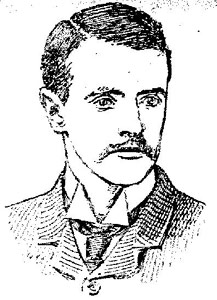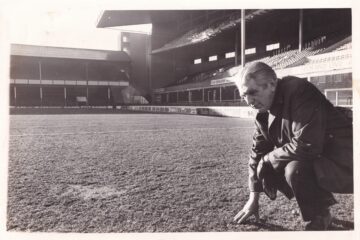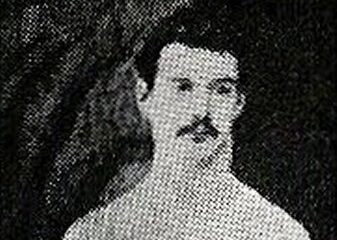Official Football League records, started September 1888, appear to indicate that Wexford born Jack Kirwen was the first Irishman to score a goal for Everton. However, on closer examination, this feat had in fact been achieved some twenty years earlier when they had first crossed the sea to play a game on the Emerald Isle. The player to do so was an Irish International from Belfast.
James Turnbull Gibb was born on 15 August 1861 to Alexander and Mary nee Turnbull. He was educated at the Royal Belfast Academical Institute where he distinguished himself on the Rugby field. On completing his education, he joined the York Road club – formed in connection with Northern Counties Railway – who played their games at Seabank. Around 1883, he switched to the game played under the rules of the Football Association and remained faithful to the code for the rest of his days. Along with his brother Albert, James first played for the Wellington Park club who had been formed in 1882 and played their home matches at Colin View (off Lisburn Road) in the Eglantine area of Belfast. On 26 January 1884, he won his first international cap when he represented Ireland -against Scotland – on the Ulster club ground at Ballynafeigh. On 19 April of that year, Wellington Park played in the Irish Challenge Cup final against the more established Distillery club. The game was played at Ballynafeigh where 2,000 spectators watched Gibb and his team mates convincingly being beaten five goals to nil. In the years that followed, he continued to represent both Wellington Park and Ireland, and may have possibly decided to attend the match planned between the Ulster club and Everton on 5 March 1887. The visit caused great deal of interest amongst the local football followers, and many of them paid in advance for admission. The weather, however, played havoc with the arrangements.

The Everton secretary, Mr Nesbit, had instructed ten of his best players to meet at the Clarence Dock in Liverpool on Friday evening for the overnight crossing aboard the Belfast Steamship Company vessel, s.s.Optic. He also invited Tom Sourbutts, a player from Blackburn, to accompany the party, but when the ferry slipped her moorings he was not aboard. Further misfortune followed. The s.s. Optic had no sooner reached the Mersey Estuary when a heavy fog forced it to stop engines and wait five hours before proceeding. The delay meant that Everton would not now arrive in time to fulfil their fixture, so alternative arrangements were quickly made by the Ulster club secretary. Mr Henderson, not wanting to disappoint the large crowd that was expected at his ground, persuaded the players of Cliftonville and YMCA to cancel their pre-arranged fixture and form themselves into a Combination X1 to provide the opposition. They immediately agreed and the game went ahead.
It had just come to an end when a loud cheer heralded the arrival of the visitors from Liverpool. The Everton party had docked just after 5pm, to find a fleet of jaunting carts waiting on the quay to whisk them to the Queens Hotel, then along Ormeau Road to their intended destination. After good humoured remarks were exchanged with the understanding crowd, the visitors cheerfully changed on the spot and played for half an hour against the Ulster side, which they won one goal to nil. All concerned then agreed that a full game would take place on Monday.

With the Everton party now confined to a longer than planned stay in Ireland, Mr Henderson took control of the situation and organised an excursion for their benefit. On Sunday morning the visitors were delighted to find transport had been arranged to take them on a ten mile journey to the tiny village of Crawsford Burn, where they spent the afternoon at their leisure. Light refreshments were also provided at The Old Inn, – a famous local landmark – before the party were returned to the Queens Hotel and the care of their genial host, Mr Shorthouse. The following day, the ten men of Everton were transported out to Ballynafeigh, where James Gibb, who had agreed to make a guest appearance, brought their complement of players up to the full number. There were around 3,000 people in attendance to see him become the first Irishman to score a goal for Everton Football Club, when he gave them the lead after 25 minutes. Club captain George Dobson then doubled their tally, but a goal by the Ulstermen had reduced the deficit at half time. The second half produced no further goals leaving the visitors the victors by two goals to one. The Everton players then quickly jumped aboard the waiting fleet of jaunting carts, and were whisked back to the ferry quayside, where a large crowd of local football followers were gathering to witness their departure. Amongst them was Irish international soccer player Samuel Johnstone, whose baritone voice could be heard above all others during the singing that commenced as the ship set sail. The Everton players waved goodbye from its upper deck, before settling down for their overnight crossing back to Liverpool. John T Gibb, who was probably also present on the quay, afterwards continued with his Irish football career.
A month later, he won his ninth and final international cap when Ireland beat Wales 4-1 on the ground of the Old Park club in Belfast. The Wellington Park club was dissolved at the end of the season, so Gibb transferred his services to Cliftonville and assisted them in reaching the Irish Cup Final of 1888. He scored the winning goal, as his new club beat Distillery by 2-1 at Ballynafeigh. His playing career was coming to an end when Cliftonville moved to their present day home, where he became club secretary.


On 2 August 1894, James T. Gibb married Sara Rodgers in Belfast, and by the 1911 census, the couple were recorded at Chestnut Gardens, now with a son, and James working as a commercial traveller. He spent the last years of his life living at Knutsford Drive, until he passed away on the 21 March 1923.

When the news of his death was announced, the flag at the Solitude football ground was lowered to half mast in respect of the many years of faithful service he had given to the club.
James T Gibbs – the first Irishman to score a goal for Everton – was laid to rest at Belfast City Cemetery.



